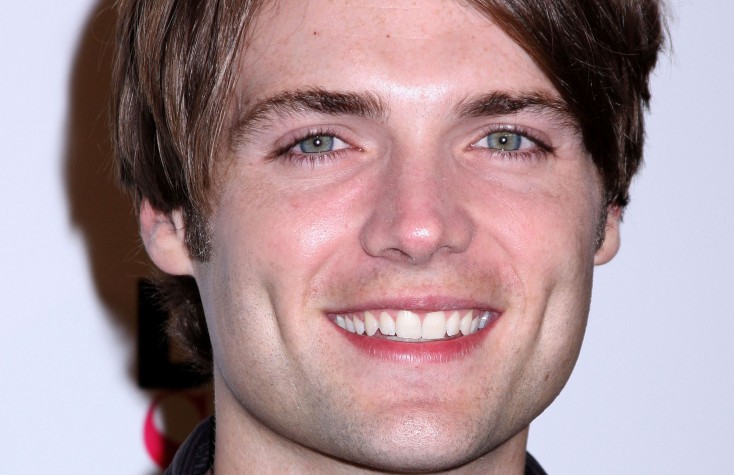By ANGELA DAWSON
Front Row Features
HOLLYWOOD—Fans of the TV series “Fringe,” will recognize Seth Gabel from his depictions of various versions of Lincoln Lee, a recurring character on the Fox sci-fi series who ultimately settled in an alternate universe.
His portrayal of a tactical agent for the military is what drew the attention of Mike Connors and Sean Mullin, who were putting together the cast for “Allegiance,” their not entirely flattering portrayal of the U.S. military’s treatment of National Guardsmen. Written and directed by Connors, it is based on Connors’ previous short film “Recalled.” (Connors and Mullin knew what they were talking about having both served in the Guard. Some of the events of “Allegiance” are based on their personal experiences.)
Gabel, who has two children with actress Bryce Dallas Howard, says he was intrigued by the script and awed by the authenticity of the main character he plays. As Lt. Danny Sefton, he is a National Guardsman whose unit is on active duty with the Army in 2004. Engaged to a beautiful fiance, Sefton has applied for and received a transfer for a cushy desk job in New York.
With just days to go before he leaves the base, his unit is suddenly called up to go to Iraq. Though happy to be going home, Sefton feels guilty by his lucky timing and senses resentment from his men that he will not be joining them on this dangerous mission. One of his underlings, a medic (played by rapper turned actor Shad “Bow Wow” Moss), learns his young son has a fatal disease, but his importance to the unit means he can’t be relieved of duty. With the base on lockdown to dissuade would-be deserters, Sefton risks everything—including imprisonment—to help his buddy escape in order for him to see his child one last time.
Gabel also is set to guest star in an upcoming episode of the CW series “Arrow,” (which returns January 16) based on the popular line of DC Comics comic books. He will play Vertigo, a ruthless drug dealer based on the comic book’s Count Vertigo character. Though he only has been signed for the one guest spot, it is possible that the villain could become a recurring character to TV series. That would suit Gabel just fine, since TV affords him time to spend with his young family.
Q: Congratulations on landing your first lead film role in “Allegiance.” How did the part come to you?
Gabel: I initially was sent the script to gauge my interest in it. When I read it, I thought it was fantastic so I had a meeting with Mike Connors, the director, and Sean Mullin, one of the producers. When I heard their story of how they were in the National Guard and what they experienced was very similar to what the characters in the film experienced, I really felt like there was a sense of authenticity with what they were creating. I thought it was a very important story to tell. My reps did a good job of convincing them I was the right person for the job so they offered me the role.
Q: Was there pressure on you to get the military aspect of the character right because these guys had actually served?
Gabel: Yes. The pressure I put on myself was to be as authentic as possible. One of the biggest indicators for me was the salute, because as an officer, your soldiers are saluting you all the time, so you need to salute back, and I really wanted that to be as authentic as possible. You’re doing it so many times a day that it becomes old hat, and I wanted to get that into my body. From the moment I found out I was doing the role, I worked on saluting all the time, and tried to make that as natural as possible. For me, that was the litmus test for whether I could be believed as a soldier.
Q: Do you have any friends or family that served in the military that you could use as a resource?
Gabel: My grandfather and great uncle served after World War II. Mike and Sean connected me with ex-Green Berets and ex-Navy SEALs, and they each had officer experience. I was able to get a lot of stories firsthand of what it was like for them and what the dynamic would be for my character in the film, in the position he’s in, being a lieutenant in a unit.
Q: Sefton risks everything to help his friend. Did you try to understand why someone would risk not only revoking his ability to get out but going to jail?
Gabel: It’s a difficult position. There’s this immense guilt that he feels. He’s still at the unit even though he’s been transferred out of it. It’s a real dilemma for him internally. He’s tortured between these two sides that want him to fight for the life he created back home and the possibility of saving a life or him taking a life if he goes overseas and see action combat. It’s a moral and ethical dilemma and the pressure of that causes him to fight for what feels right in the given moment: and that is what feels right and true changes and he’s battling that the whole time.Q: The movie doesn’t paint a flattering picture of the military. These guys are volunteers who essentially are imprisoned in this camp. What’s your perception of the tone toward the military?
Gabel: I don’t think it declares anything as being right or wrong but it reveals the simple truth of what these guys experienced.
Q: Where did you shoot this?
Gabel: We shot it in New York City. We couldn’t shoot it on actual military basis because we couldn’t get military approval for the film. There are certain circumstances where if the U.S. military likes the script then they’ll let you use real basis and equipment you have, but then they have a lot of say in what gets told in the story. We ended up shooting on a lot of ex-military bases, where were interesting to shoot on because they have been used for hundreds of years. So you could actually see holes in walls from musket balls in from wars that took place in the 1800s. You had a real sense of history and a real sense of being connected to soldiers that lived long before you, which was really amazing.
Q: What were the bases?
Gabel: It was Fort Totten and Andrews Airfield.
Q: What was it like working from Bow Wow and Aidan Quinn?
Gabel: It was great. I’d just worked with Aidan a couple months ago before that shoot on “Jonah Hex.” He played President Grant and I played his adviser, so it was interesting repeating the dynamic of him being a superior officer in many ways to my character. It was a lot of fun and I felt comfortable working with him. Bow Wow, I was really impressed by and blown away by his ability to be completely present on set and totally game for whatever was happening in the moment. We had a lot of rehearsal together and built a relationship. In New York, we spent a lot of time together in a van stuck in traffic so we were able to get pretty close and delve deep into the dialogue of the scene.
Q: What’s going on with you on “Arrow?”
Gabel: It started as one initial guest spot. We’re having conversations about continuing but there’s nothing set in stone as of yet.
Q: What can you tell me about your character Vertigo?
Gabel: They adapted the character in a way that “The Dark Knight” adapted the character Ra’s al Ghul. Instead of him being immortal or having superpowers, it’s more of a realistic depiction of a real person. Whatever superpowers the character had in the comic book for me are manifested in the form of a drug called Vertigo that I sell on the street. I’m slowly rising through the ranks of street power and becoming a real threat to the city.
Q: You’ve done a lot of work on TV and some films. Which do you prefer?
Gabel: I love doing both. What’s great about TV is that you have consistent work and you don’t need to worry about getting another job and you can get really deep into a character. What’s great about film is that you have a script that pretty much is set for a long time before you start shooting, and changes very little during the process of shooting, so you can really delve deep into a story and the hero’s journey of that character and really go deep into the moments that exist between the characters, which is a real pleasure. In TV, you’ll be shooting one script but at the same time, you’re preparing the next episode and the one after that, so there’s a lot of pressure to keep moving forward. I enjoy the process of both and I’d like to keep going back and forth before I’m forced to choose between one and the other.
Q: Do you make your home in LA?
Gabel: I’m based where my kids are, which is in Los Angeles.
Q: What are you up to now?
Gabel: I’m gearing up for pilot season because I need to find some work. There’s nothing guaranteed.






